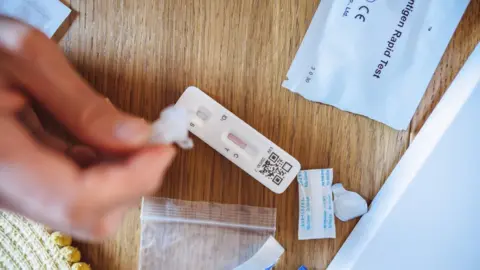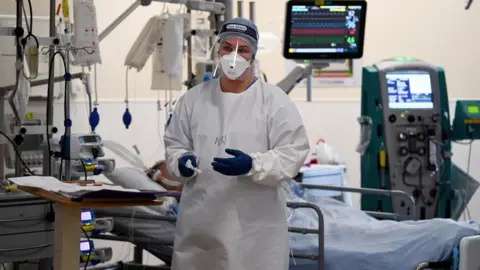Covid in Scotland: Omicron sub-variant driving increase case numbers
 Getty Images
Getty ImagesScotland's record rates of Covid are being driven by a new variant of Omicron, the chief medical officer has said.
Professor Sir Gregor Smith said about 85% of cases in Scotland were thought to be the BA.2 variant.
The World Health Organisation has said BA.2 is more transmissible than the original BA.1 Omicron strain, which emerged in Scotland in December.
However there is no evidence to suggest it is any more severe.
Scotland's remaining Covid restrictions, including the end of the legal obligation to wear masks inside public buildings, are due to be lifted next Monday.
Ahead of Nicola Sturgeon's update to Holyrood on the issue, Prof Smith said a "cautious approach... is the right approach".
Prof Smith told BBC Radio Scotland's Good Morning Scotland that countries with the BA.2 sub-variant had experienced the "quickest, sharpest rises in case rates".
He said Northern Ireland was the first UK nation to identify a rise in BA.2 and they now estimate about 1 in 13 people there have Covid.
"Scotland is probably the country who has experienced the greatest rise in BA.2 next," Prof Smith said.
"Our proportion is currently about 85% just now. And you can see those countries that have BA.2 just now are experiencing the quickest, sharpest rises in case rates."
He said England and Wales were now beginning to experience this as well. "In my view it is undoubtedly driven by the presence of BA.2," he added
Rising infection levels
 Getty Images
Getty ImagesThe Office for National Statistics estimated on Friday that Scotland had the highest rate of Covid infections since sampling began in autumn 2020.
Almost 300,000 people - about in 18 - had Covid in the previous week. The estimated infection levels have risen for six consecutive weeks.
Figures released last Wednesday showed the number of people in Scottish hospitals with Covid had reached its highest level for 13 months, with 1,636 patients.
That figure has since risen to 1,805 patients, with 27 in intensive care, according to statistics published on Monday.
Experts said numbers in intensive care were very low because of vaccinations and new treatments, but large numbers of Covid patients had an impact on bed availability and other services.
People 'adapting behaviour'
Prof Smith said he had been keeping a close eye on case numbers for the last three weeks.
"Clearly when you see cases begin to increase like this it does give you a little bit of concern," he said.
Hospital occupancy began to rise around February 14, he added.
"We're seeing more older population becoming impacted on this occasion, and that's leading to some longer lengths of stay, which is driving occupancy up as well," he said.
Prof Smith said there were "some hopeful signs" the hospital admission rate had "begun to kind of top out just a little bit over the course of the latter end of last week".
Ministers would make a decision on whether to go ahead with lifting rules on face masks shortly, he said.
Asked what advice he would give to ministers, he said: "I think that a cautious approach at this point in time is probably the right approach, and we're already seeing the public adopting those additional protections."
 Getty Images
Getty ImagesHe said data from contact tracers showed some people were adapting their behaviour by reducing their contacts and avoiding busy places, while the use of face masks was also up.
But Prof Smith said he could not predict when Covid-19 would become part of the background of everyday life.
"The one thing I've learned about this virus, more than anything else, is not to become blasé about it. It will continue to evolve. It is still at an unstable stage in its development," he said.
"Until we've got a global stability of this virus we can't say we will have domestic stability."
Last week Health Secretary Sajid Javid said the UK government had "no concerns at all" about sub-variants.
He said Omicron had been the last variant to be considered of concern but that the country had "successfully navigated" it, but he said the government continued to monitor the situation "very carefully".


